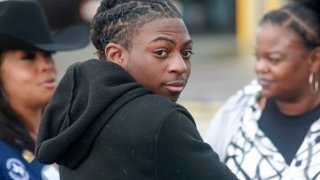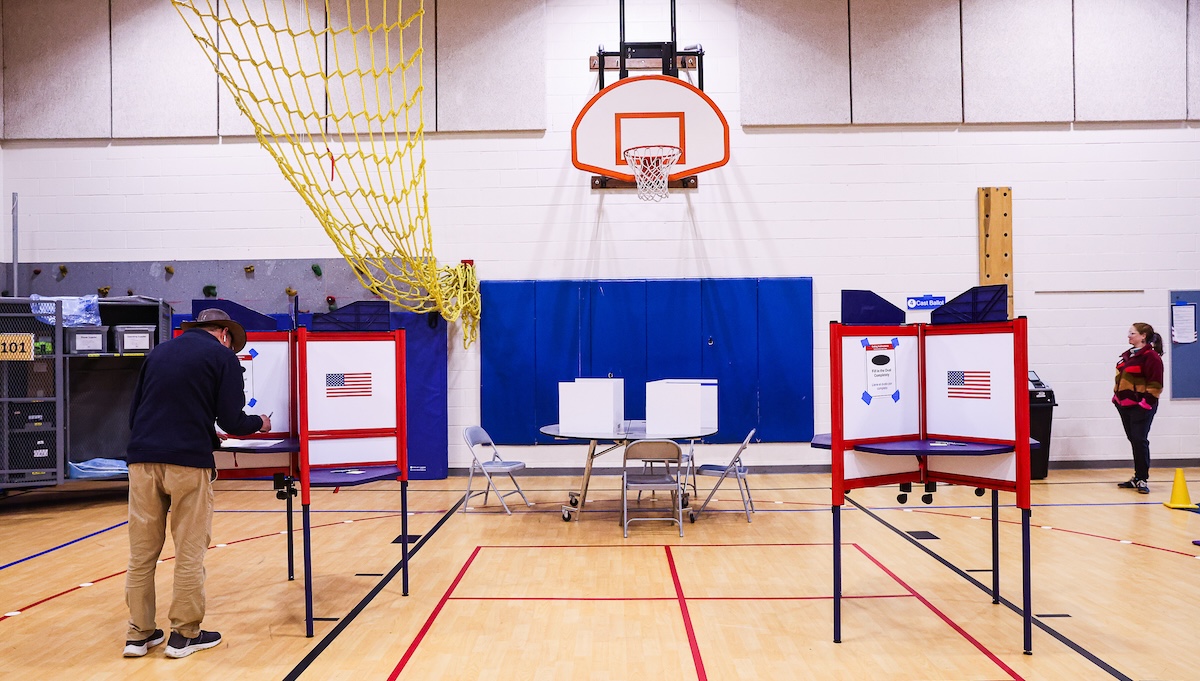
A judge will determine on Thursday whether a Texas school district can continue punishing a Black teen for refusing to change his hairstyle.
Darryl George, a junior at Barbers Hill High School in Mont Belvieu, about 30 miles from Houston, has been in in-school suspension or at an off-site disciplinary program for most of the school year. School officials said in August that George’s hair — which he wears in dreadlocks twisted neatly on top of his head, away from his face and neck — violates a district dress code regulating the length of boys’ hair, NBC News reported. According to the student handbook, male students’ hair cannot extend past the eyebrows or ear lobes.
George has received letters and messages from people encouraging him and supporting his decision to not cut his hair, the family’s attorney, Allie Booker, said. The 18-year-old has said the support has made all the difference amid the headline-making controversy.
“I just want them to know that I hear them and appreciate everything and I’ma keep fighting,” he told Booker in a text message shared with NBC News. “This fight has been a struggle on me, but with their words, it keeps me pushing.”
George’s family says his punishment violates the state’s newly implemented CROWN Act. The district filed a lawsuit in September, requesting that a judge clarify whether that’s the case. Last month, State District Judge Chap Cain III in Anahuac ordered the case to go to trial, which is slated for Thursday.
“The Texas CROWN Act protects hair texture and the wearing of braids, twists, and locs. Those with agendas wish to make the CROWN Act a blanket allowance of student expression. Again, we look forward to this issue being legally resolved,” Barbers Hill Independent School District Superintendent Greg Poole said in a statement shared with NBC News.
Gov. Greg Abbott signed the CROWN Act into law last May, prohibiting race-based hair discrimination at work, school and in housing facilities in the state. The law protects hairstyles like braids, locks and twists — or “protective hairstyles” — and bars school districts from implementing policies that “discriminate against a hair texture or protective hairstyle commonly or historically associated with race.” School officials have held that the law doesn’t address hair length, but the lawmakers who co-wrote the Texas CROWN Act said the law was intended to protect George’s hairstyle.
U.S. & World
The day's top national and international news.
“I feel like I’m missing my full experience of being in the classroom,” George told The Associated Press in October. “I hope I can start being a kid again, start living my life, start playing football again and enjoy my year, my last few years in high school.”
The family has also filed both a formal complaint with the Texas Education Agency and a civil rights lawsuit against Abbott and state attorney general Ken Paxton for allegedly failing to enforce the CROWN Act, according to the AP.

“I have a son, 18 years old, that wants to go to school, that wants to get his education, and y’all messing with him. Why?” George’s mother, Darresha George, told the AP this month. She said she’s pleased that the family will have their day in court. “I’m glad that we are being heard too. I’m glad that things are moving and we’re getting through this.”
School officials have repeatedly maintained their position. Last month, Poole took out an ad in the Houston Chronicle stating that the school’s policy does not violate the CROWN Act and declaring that the district would not bend “to political pressure.”
This is not the first time the district has found itself in hot water over its hair policies. In 2020, two students filed lawsuits after they were suspended over the length of their dreadlocks. Both students withdrew from the school but the lawsuits are pending. One of them eventually returned after a judge granted a temporary injunction for him to return to campus.
One of the students, DeAndre Arnold, garnered national attention after being told he couldn’t walk at graduation because of his hairstyle. Arnold received public support from stars like NFL player DeAndre Hopkins and Bernice King, daughter of Martin Luther King Jr. In 2020, the actor Gabrielle Union and her husband, Dwyane Wade, invited Arnold to the Academy Awards, where Matthew Cherry, creator of the Oscar-winning animated short film “Hair Love,” acknowledged Arnold during his acceptance speech.
As for George, the family’s attorney said she is optimistic about the trial’s outcome and hopes the teen will finally be able to return to school without facing discrimination.
“I believe that we do have the law on our side,” Booker said. “What I want is for us to be comfortable in our natural state. We shouldn’t have to change or conform.”
For more from NBC BLK, sign up for our weekly newsletter.
This story first appeared on NBCNews.com. More from NBC News:



